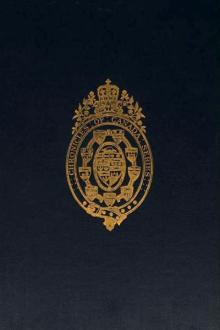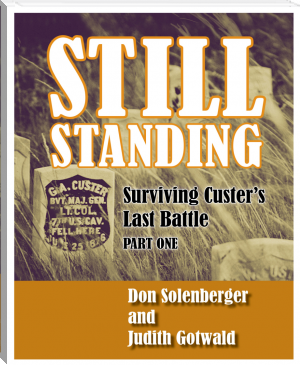The Mariner of St Malo - Stephen Leacock (great novels to read .txt) 📗

- Author: Stephen Leacock
- Performer: -
Book online «The Mariner of St Malo - Stephen Leacock (great novels to read .txt) 📗». Author Stephen Leacock
As the twilight gathered, the French withdrew to their boats, while the savages, who were loath to leave the spot, lighted huge bonfires on the shore. A striking and weird picture it conjures up before our eyes,—the French sailors with their bronzed and bearded faces, their strange dress and accoutrements, the glare of the great bonfires on the edge of the dark waters, the wild dances of the exultant savages. The romance and inspiration of the history of Canada are suggested by this riotous welcome of the Old World by the New. It meant that mighty changes were pending; the eye of imagination may see in the background the shadowed outline of the spires and steeples of the great city of to-day.
On the next day, October 3, the French were astir with the first light of the morning. A few of their number were left to guard the boats; the others, accompanied by some of the Indians, set out on foot for Hochelaga. Their way lay over a beaten path through the woods. It brought them presently to the tall palisades that surrounded the group of long wooden houses forming the Indian settlement.
It stood just below the slope of the mountain, and covered a space of almost two acres. On the map of the modern city this village of Hochelaga would be bounded by the four streets, Metcalfe, Mansfield, Burnside, and Sherbrooke, just below the site of McGill University. But the visit of Cartier is an event of such historic interest that it can best be narrated in the words of his own narrative.
We may follow here as elsewhere the translation of Hakluyt, which is itself three hundred years old, and seems in its quaint and picturesque form more fitting than the commoner garb of modern prose.
Our captain [so runs the narrative], the next day very early in the morning, having very gorgeously attired himself, caused all his company to be set in order to go to see the town and habitation of these people, and a certain mountain that is somewhere near the city; with whom went also five gentlemen and twenty mariners, leaving the rest to keep and look to our boats. We took with us three men of Hochelaga to bring us to the place.
All along as we went we found the way as well beaten and frequented as can be, the fairest and best country that can possibly be seen, full of as goodly great oaks as are in any wood in France, under which the ground was all covered over with fair acorns.
After we had gone about four or five miles, we met by the way one of the chiefest lords of the city, accompanied with many more, who, as soon as he saw us, beckoned and made signs upon us, that we must rest in that place where they had made a great fire and so we did. After that we rested ourselves there awhile, the said lord began to make a long discourse, even as we have said above they are accustomed to do in sign of mirth and friendship, showing our captain and all his company a joyful countenance and good will, who gave him two hatchets, a pair of knives and a cross which he made him to kiss, and then put it about his neck, for which he gave our captain hearty thanks. This done, we went along, and about a mile and a half farther, we began to find goodly and large fields full of such corn as the country yieldeth. It is even as the millet of Brazil as great and somewhat bigger than small peason [peas], wherewith they live as we do with ours.
In the midst of those fields is the city of Hochelaga, placed near and, as it were, joined to a very great mountain, that is tilled round about, very fertile, on the top of which you may see very far. We named it Mount Royal. The city of Hochelaga is round compassed about with timber, with three courses of rampires [stockades], one within another, framed like a sharp spire, but laid across above. The middlemost of them is made and built as a direct line but perpendicular. The rampires are framed and fashioned with pieces of timber laid along on the ground, very well and cunningly joined together after their fashion. This enclosure is in height about two rods. It hath but one gate of entry thereat, which is shut with piles, stakes, and bars. Over it and also in many places of the wall there be places to run along and ladders to get up, all full of stones, for the defence of it.
There are in the town about fifty houses, about fifty paces long, and twelve or fifteen broad, built all of wood, covered over with the bark of the wood as broad as any board, very finely and cunningly joined together.
Within the said houses there are many rooms, lodgings and chambers. In the midst of every one there is a great court in the middle whereof they make their fire.
Such is the picture of Hochelaga as Cartier has drawn it for us. Arrived at the palisade, the savages conducted Cartier and his followers within. In the central space of the stockade was a large square, bordered by the lodges of the Indians. In this the French were halted, and the natives gathered about them, the women, many of whom bore children in their, arms, pressing close up to the visitors, stroking their faces and arms, and making entreaties by signs that the French should touch their children.
Then presently [writes Cartier] came the women again, every one bringing a four-square mat in the manner of carpets, and spreading them abroad in that place, they caused us to sit upon them. This done the lord and king of the country was brought upon nine or ten men’s shoulders (whom in their tongue they call Agouhanna), sitting upon a great stag’s skin, and they laid him down upon the foresaid mats near to the captain, every one beckoning unto us that he was their lord and king. This Agouhanna was a man about fifty pears old. He was no whit better apparelled than any of the rest, only excepted that he had a certain thing made of hedgehogs [porcupines], like a red wreath, and that was instead of his crown.
He was full of the palsy, and his members shrunk together.
After he had with certain signs saluted our captain and all his company, and by manifest tokens bid all welcome, he showed his legs and arms to our captain, and with signs desired him to touch them, and so we did, rubbing them with his own hands; then did Agouhanna take the wreath or crown he had about his head, and gave it unto our captain That done, they brought before him divers diseased men, some blind, some crippled, some lame, and some so old that the hair of their eyelids came down and covered their cheeks, and laid them all along before our captain to the end that they might of him be touched.
For it seemed unto them that God was descended and come down from heaven to heal them.
Our captain, seeing the misery and devotion of this poor people, recited the Gospel of St John, that is to say, ‘IN THE BEGINNING WAS THE WORD,’ touching every one that were [sic] diseased, praying to God that it would please Him to open the hearts of the poor people and to make them know His Holy Word, and that they might receive baptism and christendom. That done, he took a service-book in his hand, and with a loud voice read all the passion of Christ, word by word, that all the standers-by might hear him; all which while this poor people kept silence and were marvellously attentive, looking up to heaven and imitating us in gestures. Then he caused the men all orderly to be set on one side, the women on another, and likewise the children on another, and to the chiefest of them he gave hatchets, to the others knives, and to the women beads and such other small trifles. Then where the children were he cast rings, counters and brooches made of tin, whereat they seemed to be very glad.
Before Cartier and his men returned to their boats, some of the Indians took them up to the top of Mount Royal.
Here a magnificent prospect offered itself, then, as now, to the eye. The broad level of the island swept towards the west, luxuriant with yellow corn and autumn foliage.
In the distance the eye discerned the foaming waters of Lachine, and the silver bosom of the Lake of the Two Mountains: ‘as fair and level a country,’ said Cartier, ‘as possibly can be seen, being level, smooth, and very plain, fit to be husbanded and tilled.’
The Indians, pointing to the west, explained by signs that beyond the rapids were three other great falls of water, and that when these were passed a man might travel for three months up the waters of the great river. Such at least Cartier understood to be the meaning of the Indians. They showed him a second stream, the Ottawa, as great, they said, as the St Lawrence, whose north-westward course Cartier supposed must run through the kingdom of Saguenay. As the savages pointed to the Ottawa, they took hold of a silver chain on which hung the whistle that Cartier carried, and then touched the dagger of one of the sailors, which had a handle of copper, yellow as gold, as if to show that these metals, or rather silver and gold, came from the country beyond that river. This, at least, was the way that Cartier interpreted the simple and evident signs that the Indians made. The commentators on Cartier’s voyages have ever since sought some other explanation, supposing that no such metals existed in the country. The discovery of the gold and silver deposits of the basin of the Ottawa in the district of New Ontario shows that Cartier had truly understood the signs of the Indians. If they had ever seen silver before, it is precisely from this country that it would have come.
Cartier was given to understand, also, that in this same region there dwelt another race of savages, very fierce, and continually at war.
The party descended from the mountain and pursued their way towards the boats. Their Indian friends hung upon their footsteps, showing evidences of admiration and affection, and even carried in their arms any of the French who showed indications of weariness. They stood about with every sign of grief and regret as the sails were hoisted and the boats bearing the wonderful beings dropped swiftly down the river. On October 4, the boats safely rejoined the Emerillon that lay anchored near the mouth of the





Comments (0)